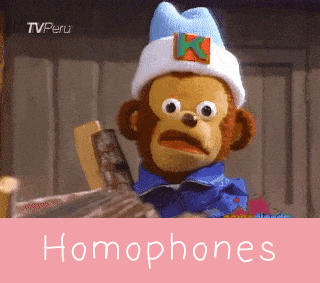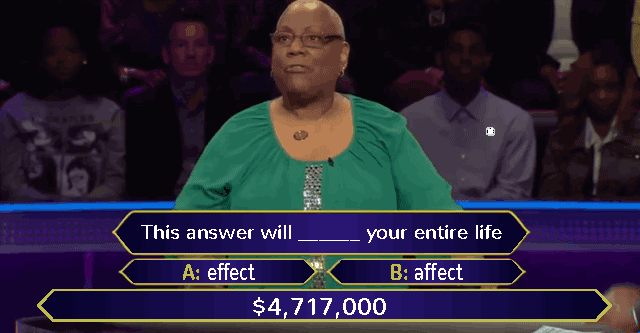Ever ventured into the dangerous realm of homophones? They’re nasty little creatures living in the woods of English language, working in groups to mock people and laugh at them. They’re almost identical words, they even sound the same, but their meaning is different, so when you see them and you’re not sure who’s who, you'll most likely end up choosing the wrong word.

Homophones pester both native speakers and English learners, so don’t worry, you’re not the only one who gets confused when choosing among very similar words. These tricky fellows are a branch of a very ancient lineage of con artists, mocking language users from the very beginning of Modern English: the notorious gang of the homonyms, homophones and homographs. As their common ancient Greek root suggests (homo- means “same”), they can have identical pronunciations but different spellings and meanings, such as to, too, and two ( homonyms ), or identical pronunciations and identical spellings but different meanings (homophones), such as quail (the bird) and quail (the verb, meaning to cringe), or even identical spellings but different pronunciations and meanings (homographs), such as the bow of a ship and the bow shooting arrows.
Language aims to perfection and economy usually: why all these ambiguities, then? Well, in most cases the reason is that the evolution of a word entails the loss of some syllables: what once was a very long runic inscription became shorter and shorter with the passing of time, until Old English chopped off most endings with its apocopes. Luckily, these words rarely occur in overlapping contexts, so that misunderstanding is not an option, or the situation easily disambiguates the clash.
Let’s focus on lightning and lightening: one is the present participle of the verb to lighten, the other is a noun referring to the electrical discharge that takes place during a storm. Ok, but which is which? Don’t worry, Ludwig’s here to help the language users in distress! Let’s take a good look at these two words.
A lightning is a flash of light produced by short-duration, high-voltage discharge of electricity within a cloud, between clouds, or between a cloud and the earth.
Specifically, lightning is the verbal noun from lightnen "make bright," or else an extended form of Old English lihting, from leht , "light, brightness, radiant energy, that which makes things visible." Old English leht (Anglian), leoht (West Saxon), "light, daylight; spiritual illumination," come from Proto-Germanic *leukhtam from PIE root *leuk- "light, brightness."

Although we did not see the lightning, we did hear the thunder.
It can also indicates a discharge of this kind:
The lightning was hot enough to melt the sand.
Or it can assumes a metaphorical meaning, indicating anything that moves very fast:
Unless swift action is taken, Nigeria could be facing a rapid takeover of a large area of its territory reminiscent of Isis's lightning advances in Iraq.
Algeria counter at lightning speed and Soudani and Feghouli both go close, only to be denied by last-ditch tackles by Philipp Lahm and Per Mertesacker respectively.
'The way in which we work, socialise, buy products and use services has changed at lightning speed since the digital revolution', said Nick Clegg, announcing the policy.
Finally, it can be used to indicate the act of making bright, or the state of being made bright; enlightenment; brightening, as of the mental powers.
Krygier's observations were a bolt of lightning for me.

Lightening
Lightening is the present participle of the verb lighten, which means “to alleviate, to reduce the burden of”. Its first occurrence dates back to mid-14 century, while starting from 1720 its intransitive sense, "become less heavy" and, therefore, “less serious, cheerful” begins to be attested.

To alleviate, to reduce the burden off:
For the future, though, the government should give the nuclear industry a chance to compete by lightening the burden it has placed on the business.
By blowing downward these fans oppose the force of gravity, effectively lightening the vehicle.
To make less serious or more cheerful:
She steers her readers deftly from court to court, nudging us, like a good hostess, with names and connections as she goes, and lightening the informational load with dry humour.
I had to lighten up people, start cracking jokes
·
Ludwig’s wrap up
Homophone words are words sounding the same, but with different meanings. They belong to the broader category of homonyms, words with the same spelling or pronunciation, but with different meanings. In the case of the two mischiefs, we focused on lightning and lightening, even though they sound the same, they come from different Proto-Indo-European roots, with different meanings as well: lightning derives from the root *leuk- "light, brightness", hence the meteorology reference, whereas lightening derives from *legwh- "not heavy, having little weight".

Even though they look almost the same, originally they were two completely different words. Time and some polishing did the trick, so they can now be very puzzling, for both native and non-native English speakers. Ludwig’s here to save you from these nasty fellows!





